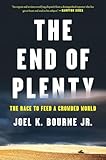The end of plenty : the race to feed a crowded world / Joel K. Bourne Jr.
Material type: TextPublisher: New York, New York : W. W. Norton & Company, 2016Copyright date: ©2015Edition: First Norton Paperback EditionDescription: 408 pages : illustrations ; 21 cmContent type: text Media type: unmediated Carrier type: volumeISBN: 039335296X; 9780393352962Other title: Race to feed a crowded worldSubject(s): Food supply -- Forecasting | Food consumption forecasting | Food security | Food consumption forecasting | Food security | Food supply -- ForecastingDDC classification: 363.8 LOC classification: HD9000.5 | .B58 2016
TextPublisher: New York, New York : W. W. Norton & Company, 2016Copyright date: ©2015Edition: First Norton Paperback EditionDescription: 408 pages : illustrations ; 21 cmContent type: text Media type: unmediated Carrier type: volumeISBN: 039335296X; 9780393352962Other title: Race to feed a crowded worldSubject(s): Food supply -- Forecasting | Food consumption forecasting | Food security | Food consumption forecasting | Food security | Food supply -- ForecastingDDC classification: 363.8 LOC classification: HD9000.5 | .B58 2016| Item type | Current library | Call number | Copy number | Status | Notes | Date due | Barcode |
|---|---|---|---|---|---|---|---|
 Books
Books
|
Main Library | HD9000.5 .B58 2016 (Browse shelf (Opens below)) | 1 | Available | STACKS | 51952000239789 |
Browsing Main Library shelves Close shelf browser

|

|

|

|

|

|

|
||
| HD87 .S543 2008 Market regulation / | HD 87.5 .A44 2001 المداخل إلى التخطيط : مدخل إلى نظريات التخطيط المتداولة آراء ونتائج / | HD9000.5 .B377 2016 Food security and sociopolitical stability / | HD9000.5 .B58 2016 The end of plenty : the race to feed a crowded world / | HD9005 .H24 2016 Organizing organic : conflict and compromise in an emerging market / | HD9016 .S33 I86 2012 نظم أسواق الغذاء : قواعد عامة وتطبيقات من الاقتصاد السعودي / | HD9110.L37 .A3 2016 Sweet success : a journey of change and challenge / |
Includes bibliographical references (pages 379-392) and index.
Part 1: -- Introduction : The erstwhile agronomist -- Curse -- Famine's lethal lessons -- The green revolution: food, sex, and war -- The plight of the Punjab -- China: landraces and Lamborghinis -- Food, fuel, and profit -- The gauntlet -- Part 2: -- The blue revolution -- Back in the USSR -- The blooming desert -- Magic seeds: feeding shareholders or the world? -- Organic agriculture: feeding the rich or enriching the poor? -- The Malawi miracle -- The Grand Desiderata -- Acknowledgments -- Notes -- Selected bibliography -- Illustration credits -- Index.
Overview: An urgent and at times terrifying dispatch from a distinguished reporter who has given heart and soul to his subject. Hampton Sides When the demographer Robert Malthus (1766-1834) famously outlined the brutal relationship between food and population, he never imagined the success of modern scientific agriculture. In the mid-twentieth century, an unprecedented agricultural advancement known as the Green Revolution brought hybrid seeds, chemical fertilizers, and improved irrigation that drove the greatest population boom in history-but left ecological devastation in its wake. In The End of Plenty, award-winning environmental journalist Joel K. Bourne Jr. puts our race to feed the world in dramatic perspective. With a skyrocketing world population and tightening global grain supplies spurring riots and revolutions, humanity must produce as much food in the next four decades as it has since the beginning of civilization to avoid a Malthusian catastrophe. Yet climate change could render half our farmland useless by century's end. Writing with an agronomist's eye for practical solutions and a journalist's keen sense of character, detail, and the natural world, Bourne takes readers from his family farm to international agricultural hotspots to introduce the new generation of farmers and scientists engaged in the greatest challenge humanity has ever faced. He discovers young, corporate cowboys trying to revive Ukraine as Europe's breadbasket, a Canadian aqua-culturist channeling ancient Chinese traditions, the visionary behind the world's largest organic sugar-cane plantation, and many other extraordinary individuals struggling to increase food supplies-quickly and sustainably-as droughts, floods, and heat waves hammer crops around the globe. Part history, part reportage and advocacy, The End of Plenty is a panoramic account of the future of food, and a clarion call for anyone concerned about our planet and its people.
1

There are no comments on this title.